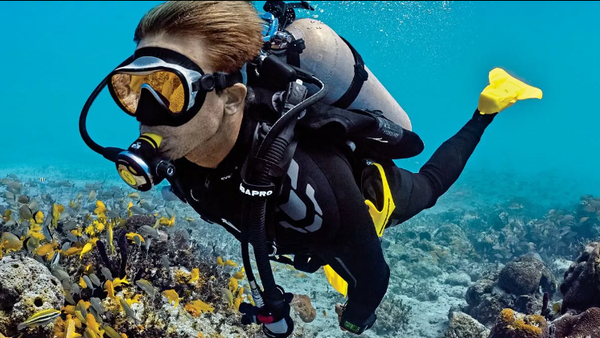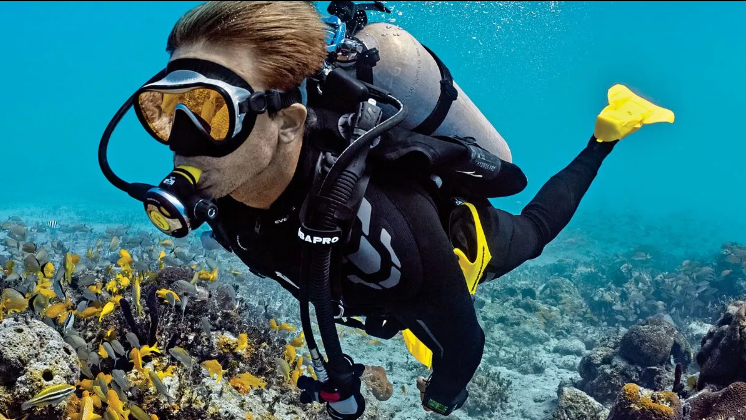Dive Lighter, Dive Freer: Embracing the Evolution of Compact and Lightweight Dive Gear for Seamless Underwater Adventures

Scuba diving has always been an exhilarating adventure, offering enthusiasts the chance to explore the mysteries of the underwater world. However, as technology advances, so does the equipment that accompanies divers on their journeys beneath the waves. One notable trend making waves in the diving community is the shift towards compact and lightweight dive gear. In this blog, we'll dive into the reasons behind this trend and explore how it's transforming the diving experience.
The Evolution of Dive Gear:
Traditionally, scuba diving equipment has been robust and, at times, cumbersome. Divers would lug around heavy tanks, bulky buoyancy control devices (BCDs), and substantial regulators. While this gear provided essential life support underwater, it posed challenges when it came to travel and maneuverability.
The Need for Change:
As more people embrace the thrill of diving and seek to explore diverse underwater locations, the demand for travel-friendly dive gear has surged. Traveling with traditional, bulky equipment became a logistical challenge, discouraging divers from exploring remote or exotic dive sites. Recognizing this need for change, the diving industry has responded with innovations geared towards making gear more compact and lightweight.
Advantages of Compact Dive Gear:
Travel Convenience: The primary advantage of compact dive gear is its travel-friendliness. Smaller, lighter equipment allows divers to pack more efficiently, whether they are heading to a tropical resort or embarking on a liveaboard expedition to a distant dive destination.
Reduced Physical Strain: Carrying heavy gear to and from dive sites can be physically demanding, especially in challenging terrains. Compact equipment significantly reduces the strain on divers, making it more accessible for a broader range of individuals, including those with physical limitations.
Improved Buoyancy Control: Innovations in BCD design have led to more streamlined and effective buoyancy control. Compact BCDs provide adequate lift while minimizing drag, resulting in a smoother and more enjoyable diving experience.
Innovations Driving the Trend:
Materials and Construction: Advanced materials, such as lightweight composites and high-tech fabrics, are being used to create durable yet lightweight dive gear.
Folding and Modular Designs: Some manufacturers have introduced folding or modular designs for fins, masks, and even regulators, allowing divers to break down their equipment into smaller, more manageable pieces for travel.
Technological Integration: The integration of cutting-edge technologies, such as carbon fiber components and 3D printing, contributes to the creation of lightweight yet robust dive gear.
Several manufacturers have been at the forefront of developing compact and lightweight dive gear. Keep in mind that new manufacturers or advancements may have emerged since then. Here are some notable manufacturers known for their innovative and travel-friendly dive equipment:
- Aqua Lung has a range of lightweight BCDs, travel-friendly regulators, and compact dive computers designed for easy transport.
- Scubapro offers a variety of travel-specific dive gear, including lightweight BCDs, travel regulators, and foldable travel fins.
- Atomic Aquatics is known for its high-performance and lightweight dive equipment. Their regulators and BCDs often incorporate advanced materials for durability and reduced weight.
- Mares has a line of travel-friendly dive gear, including compact BCDs, lightweight fins, and innovative masks suitable for divers on the go.
- Cressi manufactures a range of dive gear with an emphasis on design and functionality. They offer lightweight BCDs, travel regulators, and folding snorkels.
- Fourth Element specializes in dive clothing and accessories. While not necessarily focused on equipment, their approach to materials and design often results in lightweight and streamlined gear.
- Hollis is known for its technical dive gear, and they offer lightweight BCDs and travel-friendly regulators suitable for both recreational and technical divers.
- Zeagle is recognized for its modular and lightweight BCDs, which are designed to be versatile and travel-friendly.
- OMS (Ocean Management Systems) produces technical diving gear, and some of their products, such as lightweight wings and harness systems, are designed with travel in mind.
- Sherwood Scuba: Sherwood Scuba offers a range of dive equipment, including lightweight BCDs and compact regulators suitable for travel.
Before making any purchases, it's essential to check the latest product offerings and reviews. Diving gear preferences can be subjective, and individual needs may vary, so it's advisable to consult with dive professionals or experienced divers and explore the latest gear options from these or other reputable manufacturers.
The trend towards compact and lightweight dive gear is likely to continue evolving as technology advances. Manufacturers are increasingly focused on developing gear that not only meets the stringent safety standards of the diving industry but also enhances the overall diving experience.
The shift towards compact and lightweight dive gear marks a positive transformation in the world of scuba diving. By addressing the challenges posed by traditional equipment, these innovations are opening up new possibilities for divers to explore the beauty of the underwater world with greater ease and convenience. As technology continues to propel the industry forward, divers can anticipate more exciting developments that make their underwater adventures more accessible and enjoyable than ever before.



Share:
5 Steps to Choosing the Perfect Career Path in the Underwater World
Drysuit Diving Decisions: A Comprehensive Guide to Choosing the Perfect Drysuit for Your Comfort and Safety